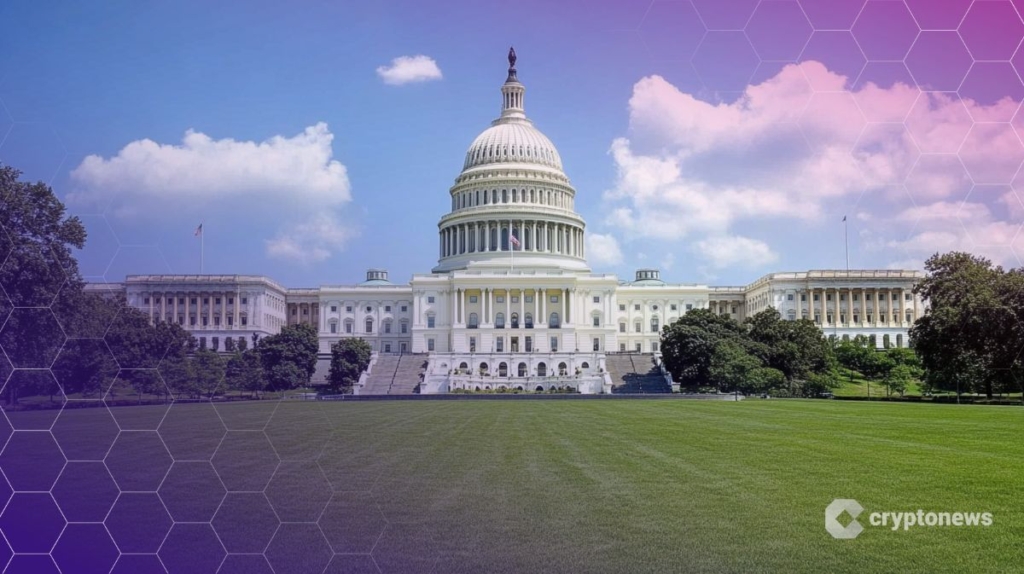A recent draft bill presented in the U.S. Senate proposes to impose emissions-related fees on data centers catering to blockchain networks and artificial intelligence operations if they surpass newly established federal environmental thresholds.
This legislation, highlighted in a Bloomberg report from April 11, is designed to address the growing environmental concerns tied to energy-intensive computing activities.
The “Clean Cloud Act,” championed by Democratic Senators Sheldon Whitehouse and John Fetterman, seeks to create regulatory measures for the technology sector.
Senate Bill Calls for EPA Emissions Standards for Large Data Centers and Crypto Operations
Under the proposed bill, the Environmental Protection Agency (EPA) would be tasked with establishing emissions performance standards for large data centers and cryptocurrency mining operations that have over 100 kilowatts of installed IT nameplate power.
The standards would take into account the emissions from regional power grids, aiming for an annual reduction of 11% in emissions.
Facilities refusing to comply would face financial penalties, with emitters charged $20 for every ton of carbon dioxide equivalent (CO2e), and this fee is projected to rise each year in accordance with inflation plus an additional $10.
The Senate Committee on Environment and Public Works has expressed concern that the energy demand from data centers and crypto miners is escalating more rapidly than the availability of carbon-free electricity, which could lead to increased energy costs for consumers.
It is anticipated that data centers might account for up to 12% of the U.S. electricity consumption by 2028, according to projections.
Research conducted by Morgan Stanley indicates that global data centers could potentially produce around 2.5 billion metric tons of CO2 emissions by 2030, prompting criticism of the bill for seemingly targeting specific sectors unfairly.
Matthew Sigel, head of research at VanEck, referred to the proposal as a misguided effort to divert responsibility toward server infrastructure, including Bitcoin mining, asserting it to be a “losing strategy.”
Dems Double Down on Losing “Blame the Server Racks” Strategy.New bill from Sens. Fetterman & Whitehouse would hit AI & crypto data centers with fees if they exceed regional emissions averages.EPA & EIA would track energy use.Proceeds to ratepayer relief & “clean” energy. pic.twitter.com/psXhlDDgl0
— matthew sigel, recovering CFA (@matthew_sigel) April 11, 2025
Furthermore, the proposed legislation may clash with the current administration’s stance on cryptocurrency and artificial intelligence.
Former President Donald Trump has undone a 2023 executive order by President Joe Biden that instituted AI safety regulations and has publicly expressed his goal to establish the U.S. as a leader in both cryptocurrency and AI innovation.
Crypto Miners Shift Focus to AI Sector
Amidst this legislative landscape, crypto mining firms such as Galaxy, CoreScientific, and Terawulf are diversifying their operations to include high-performance computing (HPC) services that cater to AI applications.
Given AI’s immense demand for data center and GPU resources, crypto mining companies are leveraging opportunities in the AI sector by adapting their existing infrastructures.
Core Scientific, for instance, announced a partnership with AI startup CoreWeave, which is expected to generate around $3.5 billion in revenue over the next 12 years.
“We view the opportunity in AI today to be one where we can convert existing infrastructure we own to host clients who are looking to install very large arrays of GPUs for their clients that are ultimately AI clients,” explained Core Scientific CEO Adam Sullivan.
Additionally, the company has identified roughly 500 megawatts of capacity available for conversion to AI facilities, which could represent the largest GPU installation dedicated to AI globally.
The post U.S. Senate Draft Bill Proposes Emissions Fees for Blockchain and AI Data Centers appeared first on Cryptonews.


























